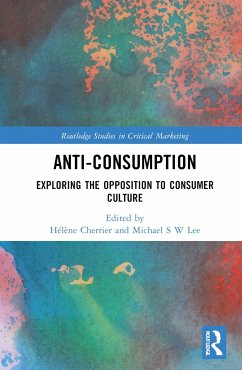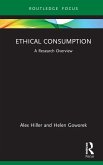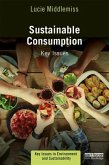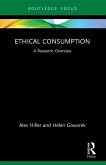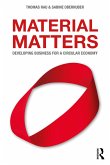Anti-Consumption
Exploring the Opposition to Consumer Culture
Herausgeber: Cherrier, Hélène; Lee, Michael S W
Anti-Consumption
Exploring the Opposition to Consumer Culture
Herausgeber: Cherrier, Hélène; Lee, Michael S W
- Gebundenes Buch
- Merkliste
- Auf die Merkliste
- Bewerten Bewerten
- Teilen
- Produkt teilen
- Produkterinnerung
- Produkterinnerung
In this edited volume, the leading scholars in the field engage with consumers, marketers, corporations and policymakers as well as space dynamics and network formation to provide an in-depth examination of anti-consumption.
Andere Kunden interessierten sich auch für
![Anti-Consumption Anti-Consumption]() Anti-Consumption42,99 €
Anti-Consumption42,99 €![Ethical Consumption Ethical Consumption]() Alex Hiller (UK Nottingham Trent University)Ethical Consumption74,99 €
Alex Hiller (UK Nottingham Trent University)Ethical Consumption74,99 €![Global Marketing Global Marketing]() Ilan Alon (Norway University of Agder)Global Marketing102,99 €
Ilan Alon (Norway University of Agder)Global Marketing102,99 €![Sustainable Consumption Sustainable Consumption]() Lucie MiddlemissSustainable Consumption42,99 €
Lucie MiddlemissSustainable Consumption42,99 €![Ethical Consumption Ethical Consumption]() Alex HillerEthical Consumption21,99 €
Alex HillerEthical Consumption21,99 €![Interfaith Marketing Interfaith Marketing]() Frank G. CabanoInterfaith Marketing142,99 €
Frank G. CabanoInterfaith Marketing142,99 €![Material Matters Material Matters]() Thomas RauMaterial Matters33,99 €
Thomas RauMaterial Matters33,99 €-
-
-
In this edited volume, the leading scholars in the field engage with consumers, marketers, corporations and policymakers as well as space dynamics and network formation to provide an in-depth examination of anti-consumption.
Hinweis: Dieser Artikel kann nur an eine deutsche Lieferadresse ausgeliefert werden.
Hinweis: Dieser Artikel kann nur an eine deutsche Lieferadresse ausgeliefert werden.
Produktdetails
- Produktdetails
- Routledge Studies in Critical Marketing
- Verlag: Taylor & Francis Ltd
- Seitenzahl: 258
- Erscheinungstermin: 1. September 2022
- Englisch
- Abmessung: 240mm x 161mm x 19mm
- Gewicht: 502g
- ISBN-13: 9780367420758
- ISBN-10: 0367420759
- Artikelnr.: 64104743
- Herstellerkennzeichnung
- Libri GmbH
- Europaallee 1
- 36244 Bad Hersfeld
- gpsr@libri.de
- Routledge Studies in Critical Marketing
- Verlag: Taylor & Francis Ltd
- Seitenzahl: 258
- Erscheinungstermin: 1. September 2022
- Englisch
- Abmessung: 240mm x 161mm x 19mm
- Gewicht: 502g
- ISBN-13: 9780367420758
- ISBN-10: 0367420759
- Artikelnr.: 64104743
- Herstellerkennzeichnung
- Libri GmbH
- Europaallee 1
- 36244 Bad Hersfeld
- gpsr@libri.de
Hélène Cherrier is an award-winning Professor in Marketing at Skema Business School, Sophia Antipolis, France. Hélène has worked at internationally renowned institutions such as RMIT, Melbourne, Australia; Griffith University, Brisbane, Australia; the American University of Dubai, United Arab Emirates; LUISS University, Rome, Italy; Sydney University, Sydney, Australia, and Westminster University, London, UK. Hélène has been interested in the forces of market constituents responsible for shaping and nurturing unsustainable consumption, often in the context of waste, since completing her PhD at the University of Arkansas focusing on voluntary simplicity and consumer identity. Hélène has edited a book on downshifting and published her work in prestigious journals such as the Journal of Consumer Research; Journal of Business Research, Journal of Public Policy & Marketing, Consumption, Markets and Culture, Journal of Marketing Management, and Journal of Consumer Affairs. Hélène has also been an active participant in dumpster diving, home-free living, clothes swapping, and zero waste experiments, and she struggles to maintain a low impact consumption as a mother of five children. Michael S.W. Lee is an award-winning Associate Professor of Marketing at The University of Auckland with research interests in anti-consumption and consumer resistance, and specific expertise in the area of brand avoidance, innovation resistance, dissatisfaction and complaining behaviours. An offshoot of his doctoral research delved into consumer perceptions of brands associated with genetic modification. Overall he is interested in why people reject certain markets or offerings and how industries can understand consumers better in order to adapt, improve, become more sustainable or, in some cases, overcome resistance. His latest research applies anti-consumption to areas of public policy and consumer well-being, where he is particularly interested in consumer perceptions, attitudes and behaviour towards waste and waste utilisation. He has been awarded over $150,000 in funding for various research projects and has published and/or guest edited special issues in The Journal of Business Research; Consumption, Markets and Culture; European Journal of Marketing; Advances in Consumer Research; Journal of Consumer Marketing; Journal of Consumer Behaviour; Journal of Macromarketing; Journal of Global Marketing; Australasian Marketing Journal; Journal of Public Policy and Marketing; Journal of Consumer Affairs; and Psychology & Marketing. Recognising a need for international collaboration, Mike founded The International Centre of Anti-Consumption Research (ICAR) in 2005. Under his Directorship, ICAR continues to organise international symposiums and special issues in quality journals, providing an avenue of research for hundreds of scholars. Mike's contribution to the area has resulted in the Association of Consumer Research recognising anti-consumption as an official field of inquiry.
Introduction
Hélène Cherrier and Michael S.W. Lee
Part 1. What Is Anti-Consumption?
Chapter 1: Consumer Boycott Participation: Evidence for the
Trigger/Promoter/Inhibitor Model
Stefan Hoffmann
Chapter 2: The evolution of Voluntary Simplicity: From Soulful Search for
Meaning to Extreme Lifestyle Experiments
Stephen Zavestoski and Marilyn DeLaure
Chapter 3: How Green Demarketing Brands Can Successfully Support
Anti-Consumption
Catherine Armstrong Soule and Tejvir Sekhon
Chapter 4: "I am NOT a Consumer" or "I Don't WANT to be a Consumer" or "I
CAN'T be a Consumer": A Fresh Look at the New Strategies Consumers Use to
Avoid the Marketplace
Susan Dobscha
Chapter 5: Anti-Consumers, Pro-Consumers, and Two Social Paradigms of
Consumption
Jim Muncy and Rajesh Iyer
Part 2. Why Is Anti-Consumption Important?
Chapter 6: Anti-Consumption and Our Current Crisis of Care
Andreas Chatzidakis
Chapter 7: Different Sides of the Same Coin? Political Ideology Inflects
How Symbolism Relates to Mask Avoidance or Adoption in the Age of COVID-19
Charles S. Areni and Hélène Cherrier
Chapter 8: Anti-Consumption In Emerging Markets
Pragea Geldoffy Putra and Michael S.W. Lee
Chapter 9: The Trio of Religiosity, Materialism, and Anti-Consumption in
Explaining
Life Satisfaction
Betul Balikcioglu and Faith Mehmet Kiyak
Part 3. The Future of Anti-Consumption Research
Chapter 10: The "Fake It Till We Make It" Path to a Shared, sustainable
society
Karen V. Fernandez
Chapter 11: Promoting Consumption Reduction: A Behaviour Change Challenge
Ken Peattie
Chapter 12: Socially Oriented Anti-Consumption
Nieves García-de-Frutos and José Manuel Ortega-Egea
Hélène Cherrier and Michael S.W. Lee
Part 1. What Is Anti-Consumption?
Chapter 1: Consumer Boycott Participation: Evidence for the
Trigger/Promoter/Inhibitor Model
Stefan Hoffmann
Chapter 2: The evolution of Voluntary Simplicity: From Soulful Search for
Meaning to Extreme Lifestyle Experiments
Stephen Zavestoski and Marilyn DeLaure
Chapter 3: How Green Demarketing Brands Can Successfully Support
Anti-Consumption
Catherine Armstrong Soule and Tejvir Sekhon
Chapter 4: "I am NOT a Consumer" or "I Don't WANT to be a Consumer" or "I
CAN'T be a Consumer": A Fresh Look at the New Strategies Consumers Use to
Avoid the Marketplace
Susan Dobscha
Chapter 5: Anti-Consumers, Pro-Consumers, and Two Social Paradigms of
Consumption
Jim Muncy and Rajesh Iyer
Part 2. Why Is Anti-Consumption Important?
Chapter 6: Anti-Consumption and Our Current Crisis of Care
Andreas Chatzidakis
Chapter 7: Different Sides of the Same Coin? Political Ideology Inflects
How Symbolism Relates to Mask Avoidance or Adoption in the Age of COVID-19
Charles S. Areni and Hélène Cherrier
Chapter 8: Anti-Consumption In Emerging Markets
Pragea Geldoffy Putra and Michael S.W. Lee
Chapter 9: The Trio of Religiosity, Materialism, and Anti-Consumption in
Explaining
Life Satisfaction
Betul Balikcioglu and Faith Mehmet Kiyak
Part 3. The Future of Anti-Consumption Research
Chapter 10: The "Fake It Till We Make It" Path to a Shared, sustainable
society
Karen V. Fernandez
Chapter 11: Promoting Consumption Reduction: A Behaviour Change Challenge
Ken Peattie
Chapter 12: Socially Oriented Anti-Consumption
Nieves García-de-Frutos and José Manuel Ortega-Egea
Introduction
Hélène Cherrier and Michael S.W. Lee
Part 1. What Is Anti-Consumption?
Chapter 1: Consumer Boycott Participation: Evidence for the
Trigger/Promoter/Inhibitor Model
Stefan Hoffmann
Chapter 2: The evolution of Voluntary Simplicity: From Soulful Search for
Meaning to Extreme Lifestyle Experiments
Stephen Zavestoski and Marilyn DeLaure
Chapter 3: How Green Demarketing Brands Can Successfully Support
Anti-Consumption
Catherine Armstrong Soule and Tejvir Sekhon
Chapter 4: "I am NOT a Consumer" or "I Don't WANT to be a Consumer" or "I
CAN'T be a Consumer": A Fresh Look at the New Strategies Consumers Use to
Avoid the Marketplace
Susan Dobscha
Chapter 5: Anti-Consumers, Pro-Consumers, and Two Social Paradigms of
Consumption
Jim Muncy and Rajesh Iyer
Part 2. Why Is Anti-Consumption Important?
Chapter 6: Anti-Consumption and Our Current Crisis of Care
Andreas Chatzidakis
Chapter 7: Different Sides of the Same Coin? Political Ideology Inflects
How Symbolism Relates to Mask Avoidance or Adoption in the Age of COVID-19
Charles S. Areni and Hélène Cherrier
Chapter 8: Anti-Consumption In Emerging Markets
Pragea Geldoffy Putra and Michael S.W. Lee
Chapter 9: The Trio of Religiosity, Materialism, and Anti-Consumption in
Explaining
Life Satisfaction
Betul Balikcioglu and Faith Mehmet Kiyak
Part 3. The Future of Anti-Consumption Research
Chapter 10: The "Fake It Till We Make It" Path to a Shared, sustainable
society
Karen V. Fernandez
Chapter 11: Promoting Consumption Reduction: A Behaviour Change Challenge
Ken Peattie
Chapter 12: Socially Oriented Anti-Consumption
Nieves García-de-Frutos and José Manuel Ortega-Egea
Hélène Cherrier and Michael S.W. Lee
Part 1. What Is Anti-Consumption?
Chapter 1: Consumer Boycott Participation: Evidence for the
Trigger/Promoter/Inhibitor Model
Stefan Hoffmann
Chapter 2: The evolution of Voluntary Simplicity: From Soulful Search for
Meaning to Extreme Lifestyle Experiments
Stephen Zavestoski and Marilyn DeLaure
Chapter 3: How Green Demarketing Brands Can Successfully Support
Anti-Consumption
Catherine Armstrong Soule and Tejvir Sekhon
Chapter 4: "I am NOT a Consumer" or "I Don't WANT to be a Consumer" or "I
CAN'T be a Consumer": A Fresh Look at the New Strategies Consumers Use to
Avoid the Marketplace
Susan Dobscha
Chapter 5: Anti-Consumers, Pro-Consumers, and Two Social Paradigms of
Consumption
Jim Muncy and Rajesh Iyer
Part 2. Why Is Anti-Consumption Important?
Chapter 6: Anti-Consumption and Our Current Crisis of Care
Andreas Chatzidakis
Chapter 7: Different Sides of the Same Coin? Political Ideology Inflects
How Symbolism Relates to Mask Avoidance or Adoption in the Age of COVID-19
Charles S. Areni and Hélène Cherrier
Chapter 8: Anti-Consumption In Emerging Markets
Pragea Geldoffy Putra and Michael S.W. Lee
Chapter 9: The Trio of Religiosity, Materialism, and Anti-Consumption in
Explaining
Life Satisfaction
Betul Balikcioglu and Faith Mehmet Kiyak
Part 3. The Future of Anti-Consumption Research
Chapter 10: The "Fake It Till We Make It" Path to a Shared, sustainable
society
Karen V. Fernandez
Chapter 11: Promoting Consumption Reduction: A Behaviour Change Challenge
Ken Peattie
Chapter 12: Socially Oriented Anti-Consumption
Nieves García-de-Frutos and José Manuel Ortega-Egea

